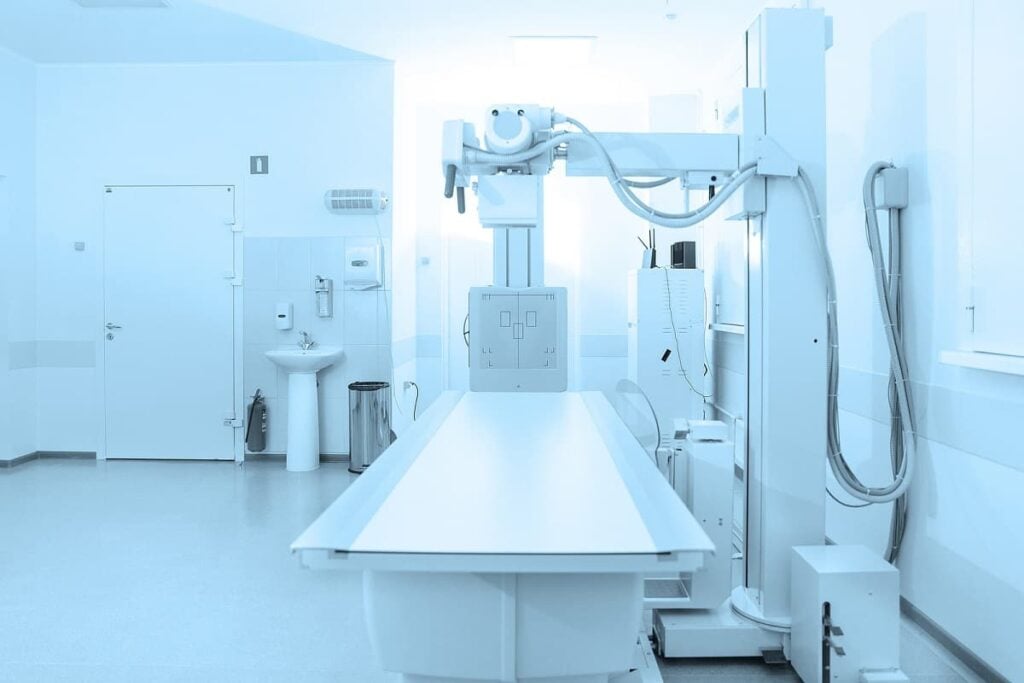Babylon Health Stock: Value-Based Care Using Telehealth
Table of contents

Last year, we judged Teladoc (TDOC) as the best investment into the telehealth theme – and that was just a few months before the company’s $18.5 billion blockbuster acquisition of Livongo, which developed an AI platform for managing chronic diseases like diabetes. The business model is all about providing services virtually through apps, chats, and video consultations. That keeps people out of the doctor’s office or hospital, which theoretically reduces healthcare costs by promoting a preventive self-care model. Teladoc has grown its business through technology development and a dozen acquisitions over a half-dozen years. Now a new threat is emerging on the public markets. London-based Babylon Health, which rose to prominence for its AI healthcare chatbot, is merging with a special purpose acquisition company (SPAC) and is aggressively growing its telehealth business on U.S. soil.
Will Babylon Health be a contender or a pretender?
A Brief History of Babylon Health
Founded in 2013, Babylon Health first caught our attention about four years ago when we pondered the question of whether its AI chatbot represented the future of healthcare. The app was sort of an interactive version of WebMD, as patients used a Q&A function to get at the root of their dysfunction. The primary customer back then was Britain’s National Health Service (NHS).
The company continued to pop up on our radar. In 2020, it topped our list of AI healthcare startups deploying virtual assistants. By then, Babylon Health had raised more than $630 million at a valuation of about $2 billion. It had grown to be the fifth-largest medical practice in the UK, providing not just chat and video support, but remote patient monitoring. The company had also attracted its share of critics, with some calling it the next Theranos – alluding to the disgraced blood-testing company – and questioning the safety of its AI platform.

It still made our list of top telehealth companies earlier this year. Two of the five startups on that list – MDLIVE and Doctor on Demand – have been acquired since the article was published in February. A third company focused on mental health, Talkspace, was in the midst of going public through a SPAC reverse merger. On top of that, we just published a list of six telehealth companies to reach billion-dollar valuations in the first half of this year. In fact, telehealth netted $4.2 billion in funding in the first quarter of 2021 – the third consecutive quarter to hit record highs, according to data research firm CB Insights.
Babylon Health Leadership and Investors
That gives you a sense of just how dynamic and competitive telehealth is becoming. Babylon Health itself was pushing hard into the U.S. healthcare market before this month’s announcement it would jump on the SPAC crazy train through a merger with Alkuri Global Acquisition Corp. (KURI). The guy who will be in charge of the new $4.2 billion company is the founder and current CEO of Babylon Health, Dr. Ali Parsa.
Previously, Dr. Parsa co-founded Circle Health, the first private company to run an NHS hospital. Circle Health has something of a history of overpromising on delivering quality care at affordable prices. While much of the criticism came shortly after Dr. Parsa’s departure in 2012, investors have to wonder how far the apple falls from the tree.
There will certainly be plenty of money to fertilize the new tree, as the merger is expected to net Babylon Health as much as $575 million, between $345 million in cash held by Alkuri and another $230 million in private investments at $10 per share. One notable name among the new investors is Palantir (PLTR), a company founded by billionaire bloodsucker Peter Thiel that vacuums up big data and analyzes it using AI for covert business intelligence.
Babylon AI Gets an Upgrade
Babylon Health has continued to develop its own AI technology platform, including its symptom checker. In a paper published last year in Nature Communications, researchers demonstrated that its AI Brain can out-diagnose doctors using a technique called causal machine learning. Currently, AI symptom checkers offer guidance based on correlations, which is different from causation, which may explain why some patients may receive some odd bits of advice like taking a cold shower during a herpes flare-up. The new type of machine learning acts as a sort of “imagination so the AI could consider what symptoms it might see if the patient had an illness different to the one it was considering.” That allows the AI to tease apart the potential causes of a patient’s illness.

Here’s how the battle between algorithms and humans went down: About 20 general practitioners created more than 1,600 realistic medical cases that included typical and atypical examples of symptoms for more than 350 illnesses. A separate group of 44 Babylon doctors then reviewed an average of 159 cases and listed the illnesses they considered most likely. Babylon’s AI took the same tests and used both an older algorithm based on correlations (created specifically for this research, not taken from its product) and the causal one. The doctors and older algorithm were on par, with an average score of 71.4% and 72.5%, respectively. The new causal algorithm scored over 77%, which was higher than 32 of the doctors.
Virtual Value-Based Care
The company calls its digital-first, value-based care service Babylon 360, which combines AI with human medical experts. Like Teladoc, Babylon emphasizes virtual care through apps, chats, and video consultations in order to keep patients out of the hospital and keep costs low. It claims from surveys that more than 40% of remote consultations helped patients avoid the emergency room or urgent care clinic. The platform basically manages members’ healthcare through a suite of digital products, collecting data on a Palantir-type scale and giving them insights into their wellbeing, as well as enabling users to set personalized health goals. B360 then provides patients with actions and rewards to help them achieve those goals.

But Babylon is moving well beyond being the first line of digital medical defense. The company’s long-term goal is to take full responsibility for a patient’s health from cradle to grave. In effect, Babylon receives the “entire budget of the patient” (minus about 20% to its partner) to help manage his or her care, including secondary care, such as hospitalization or rehabilitation. This isn’t just a theoretical business model. Babylon Health is already doing it in California, where it covers about two million people, including about 50,000 who have already been converted to the value-based model.

Babylon projects its future profits will come more from fixing human hardware than developing AI software because it will shift the focus to primary care and prevention. The fact that the company is planting its flag in the United States, where people fry butter on sticks and eat it, should give investors pause. Let’s talk more about the pros and cons of a Babylon Health stock.
To Buy or Not To Buy
Babylon claims it currently covers 24 million people in 16 countries, and has agreements with licensed providers in all 50 U.S. states. As we said, the company is focused on the United States, which accounts for about 84% of its current revenue, followed by 9% in the UK, with the rest coming from other developed countries and some emerging markets like Rwanda and Southeast Asia.
Babylon has been moving fast since it arrived in the United States last year. It now covers about three million people, mostly in California. For instance, in March, the company made an undisclosed investment in Fresno, California-based FirstChoice Medical Group, which serves nearly 50,000 Medicare Advantage and Medi-Cal enrollees. Last month, it outright purchased another provider, Meritage Medical Network, adding another 20,000 Medicare Advantage and commercial HMO patients. This month it announced the $40 million acquisition of Chicago-based Higi, which has a nationwide network of 10,000 FDA-cleared, free-to-use self-screening smart health stations that allow users to connect their biometric data with an app.

While this is the sort of rapid expansion we like to see in a tech company, we’re less excited about Babylon taking on the risks associated with onboarding thousands of patients and ownership of a network of expensive blood pressure-checking machines when cheaper and smaller sensors are so ubiquitous today.
Revenues are respectable. The company made $79 million in 2020, which represented a nearly 400% jump in revenue from the year before. It also lost about $142 million, which isn’t unexpected. Babylon expects to triple revenue this year to about $321 million, while losing about the same amount of money. That seems doable, given the company is only a couple of contracts and $67 million shy of its goal with half the year to go. Projections get a little more optimistic as the timeline moves right:

While the shiny investor deck offers some numbers, we like to see more of the arithmetic. Transparency is one red flag in just about every SPAC deal, which is why we’ve rarely taken the plunge to invest in startups merging with blank check companies. It’s not just about transparency behind the numbers but all of the risks that are involved. One is pretty obvious: Trying to build the first virtual value-based care model in the world’s most byzantine healthcare system has to rank as one of the biggest. And, frankly, the results at Dr. Parsa’s previous company aren’t too encouraging, especially as the U.S. experiment is just getting started. Of course, it’s an apples and oranges comparison between two very different healthcare systems. After all, how hard can it be to squeeze a little juice out of a $3.8 trillion market?
Conclusion
Our thesis remains that Teladoc is still the best telehealth stock on the market. The stock has lost nearly half its value since February, which is great if you’re considering a position. Like many tech stocks that were way overpriced in last year’s castrated bull market, Teladoc is undergoing a normal correction. It just seems extreme in today’s environment when we have come to expect (for no good reason) triple-digit returns. And that’s exactly what SPACs are notorious for trying to sell us – unrealistic expectations.
Sign up to our newsletter to get more of our great research delivered straight to your inbox!
Nanalyze Weekly includes useful insights written by our team of underpaid MBAs, research on new disruptive technology stocks flying under the radar, and summaries of our recent research. Always 100% free.
















Last year Babylon was projecting 2022 revenue to be $700M. Now their guidance for 2022 is $1B. Hugely impressible.
Valuation is extremely low: market cap = $483.0M. That makes forward P/S ratio around 0.5.
First quarter 2022 revenue grew over 3.5x year-over-year to $266 million.
Company is firing on all cylinders. It looks like a bargain.
We’ll probably look to do an updated piece on them.
From the latest earning call:
“we continue to make progress towards our goal of profitability no later than 2025”.
“a key priority for us in 2022 and beyond is to demonstrate to the market that we can continue to deliver exponential growth, while at the same time the diligently focusing on balancing the cost of that growth”.
Nice one, thank you for that. We’ll look to an update on Babylon soon.
Babylon Announces Cost Reduction Actions to Accelerate Path to Profitability. Expects to generate savings of up to $100M per year.
Efficiencies are being implemented during Q3 2022, with the expected financial impact being predominantly from Q4 2022 onwards.
As a result, Babylon is improving its Adjusted EBITDA guidance for FY 2022 from $(295) million or less to $(270) million or less, with forecasted monthly December 2022 Adjusted EBITDA of $(18) million or less. There is no change to Babylon’s revenue guidance being $1.0 billion or greater for FY 2022.
We absolutely need an update on Babylon but it’s dreadfully difficult to follow their business model and inner workings. We’ll put someone on it soon enough.